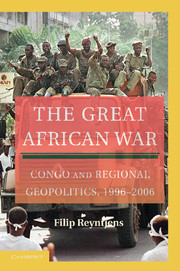Book contents
- Frontmatter
- Contents
- Acknowledgements
- List of Maps
- Introduction
- 1 A Region in Turmoil
- 2 The ‘War of Liberation’
- 3 Massacre of the Rwandan Refugees
- 4 The Fall of the Mobutist State
- 5 Congo: Waiting for Another War
- 6 Impasse in Rwanda and Burundi
- 7 ‘The First African World War’
- 8 Negotiating the Transition
- Conclusion
- Appendix 1 Sources on the killings of Rwandan refugees in early 1997
- Appendix 2 Chronology
- Appendix 3 List of abbreviations
- References
- Index
5 - Congo: Waiting for Another War
Published online by Cambridge University Press: 18 December 2009
- Frontmatter
- Contents
- Acknowledgements
- List of Maps
- Introduction
- 1 A Region in Turmoil
- 2 The ‘War of Liberation’
- 3 Massacre of the Rwandan Refugees
- 4 The Fall of the Mobutist State
- 5 Congo: Waiting for Another War
- 6 Impasse in Rwanda and Burundi
- 7 ‘The First African World War’
- 8 Negotiating the Transition
- Conclusion
- Appendix 1 Sources on the killings of Rwandan refugees in early 1997
- Appendix 2 Chronology
- Appendix 3 List of abbreviations
- References
- Index
Summary
Contrary to what many in the region and in the wider international community had hoped and believed, Kabila's accession to power heralded neither the reconstruction of the Congolese state nor the end of regional instability. On the contrary, all the ingredients for the resumption of war came to the fore during the first half year of Kabila's presidency. This chapter analyses the interbellum and why it inexorably led to renewed conflict.
The ‘Liberated Territories’ In The East
Two Problems Worse Than Before
While the populations living in the ‘liberated territories’ initially welcomed the AFDL rebellion, mainly because it ended the abuse of the FAZ, they rapidly grew disenchanted with the ‘new masters’. As mentioned earlier, the problems which were at the origin of Kabila's ‘rebellion’ had not disappeared: the security of neighbouring countries and the status of the Banyarwanda.
Several security agreements were signed between the DRC on the one hand, and Rwanda, Burundi and Uganda on the other. For instance, it was agreed in early September 1997 that the new Forces armées congolaises (FAC) and the RPA were to carry out a joint campaign against the mai-mai and the Interahamwe, particularly in the Masisi region. At the end of April 1998, Congolese interior minister Kakudji announced that accords on security were agreed with Uganda and Burundi, while another agreement provided for the training by Uganda of the officer corps of the Congolese police. However, these official signs of goodwill only moderately convinced the eastern neighbours. Ugandan and Rwandan officials said in private that their countries had asked President Kabila to commit more military resources to the east or to allow them ‘to do the job’.
- Type
- Chapter
- Information
- The Great African WarCongo and Regional Geopolitics, 1996–2006, pp. 144 - 169Publisher: Cambridge University PressPrint publication year: 2009



